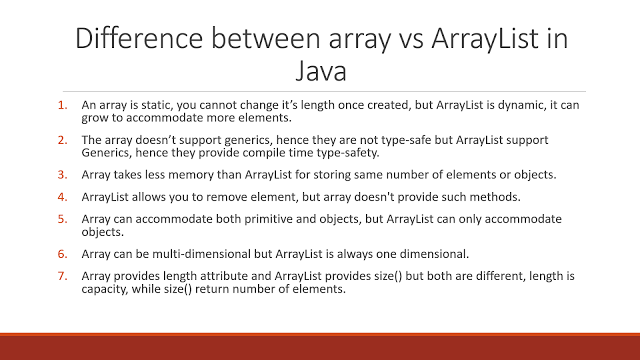
Note: ArrayList in Java (equivalent to vector in C++) having dynamic size. Here Type is the type of elements in ArrayList to be created Syntax: Declaring an Arraylist Arraylist al = new ArrayList Now let us dwell on the next concept of ArrayList that is as follows It is very important statement and is left unveiliable when it comes to deep understanding of memory storage in arrays. Note: arr(0) returns the first element of the array so it does mean that if we try to print out arr(0) then we will get Element1. which is containing continuous 100 block associated in it This does means we are declaring a memory block named 'arr' It is preferable if we have very limited array elements Type 2: Declaring than initializing elements later.



#Get object from array vs arraylist how to
How to declare a pointer to a function?.An Uncommon representation of array elements.Dangling, Void, Null and Wild Pointers.Implementing a Linked List in Java using Class.ISRO CS Syllabus for Scientist/Engineer Exam.ISRO CS Original Papers and Official Keys.GATE CS Original Papers and Official Keys.This combination could also result in a hole in the type safety. You could add everything (except for primitives, autoboxing was also added Java 5) to this collection (Integer, String, Cat, Dog, Plane.) and you would not get any runtime exception on adding, but you have to be very careful when retrieving these elements using instanceof operator to decide the type of the object, because an Integer is not a Dog, nor a Plane Java is known for its backwards compatibility, so in Java 7 you can - or must - combine generics lists with non-generic lists. So in Java 1.4 (and prior versions) you had a simple ArrayList (without generic parameter). (But as you maybe know these generics were introduced in Java 5. But for the OCAJP7 you just need to know that when you have an ArrayList, you can't add integers to this collection. For an ArrayList it's a bit more complex. You'll learn everything about threads, synchronized methods and thread safety in the OCPJP7 certification and you'll encounter many and experiences then ) But as you can notice this comment is placed into brackets, because it's not on this certification. Even if you have a thread-safe class, like StringBuffer or Vector, you still have to be very careful when more than 1 thread will be accessing. Actually that statement is true for every mutable object. Both array and ArrayList are not thread-safe. I have not yet passed the OCAJP7 so I hope the moderator chimes in with something more substantial. Arrays and Arraylists are type safe with some exceptions based on the examples above. Arrays and ArrayLists are not thread safe.Ģ. Would someone please verify the following:ġ. This is a hole in the type safety provided by arrays. This will compile fine but will fail at runtime. Sa = new Integer(10) //Type mismatch: cannot convert from Integer to String Will not compile because the compiler knows that list1 can only contain Strings. The method add(String) in the type ArrayList is not applicable for the arguments (Integer) Since ArrayList is a generics enabled class, it helps you write type safe code.
#Get object from array vs arraylist code
You have to write additional code to ensure thread safety. If you have multiple threads trying to add and remove elements from an ArrayList, Arrays and ArrayLists are not thread safe:Īn ArrayList, just like an array is not thread safe.


 0 kommentar(er)
0 kommentar(er)
